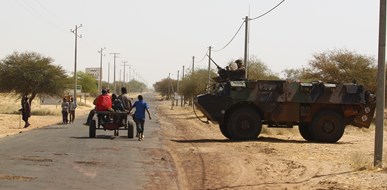[New blog post] The ICC’s channels of communication: ICC Defence perspectives on outreach missions and the right to fair trial
Published 8 May 2023
6 February 2013. Timbuktu, Mali. The Tuareg Rebellion of 2012 was an early stage of the Northern Mali conflict; from January to April 2012. @ Shutterstock
In an article published in Völkerrechtsblog, Asser Institute intern-trainee Catherine Gregoire concludes that the Registry of the International Criminal Court (ICC) should be responsible for actively ensuring Defence participation in outreach missions. In doing so, Catherine asserts that the ICC can strengthen the protection of fair trial rights and manage affected communities’ expectations more effectively.
The article centres on a recent Decision by the ICC Trial Chamber X (the Chamber) rejecting a Request submitted by the Defence in the case of Al Hassan. The proceedings largely concern the use of impartial language in articles published by the Outreach Unit – managed by the Registry - recounting their activities and participants’ comments while on an outreach mission in Timbuktu, Mali.
The proceedings highlight the Registry’s challenges in fostering an accurate and impartial understanding of the Court’s functioning amongst affected communities on outreach missions. As such, Catherine argues that the Chamber’s Decision fails to consider the broader substantive and symbolic implications on the inclusion of outreach missions as part of a fair trial when the Defence is not, in comparison to the Prosecution, actively communicated with on missions taking place and the participation opportunities available. Simultaneously, more consistent and established practices in organising outreach missions would help to maintain transparency and trust for the Defence.
The proceedings come at a timely moment following the most recent debates on the treatment and working conditions of ICC Defence staff and their implications on fair trials. At the same time, the Office of the Prosecutor has completed its “(Draft) Strategic Plan for 2023-2025” with a strategic goal to enhance outreach with affected communities. Catherine views these developments and outreach missions as the perfect moment for the Registry to define its position through practice as neutral organ and channel of communication of the Court.
Read more
In May 2021 the Asser Institute and Amnesty International released their report ‘The Rome Statute at 40’. The report contains key findings and recommendations by expert stakeholders on the future of the International Criminal Court (ICC) and the ‘system’ of international justice created by the Rome Statute, the treaty that established the Court. It highlights that to improve the effectiveness of the ICC, the court and all its stakeholders should consider how more ‘local stakeholders’ and ‘affected communities’ can better engage with the court.
The Asser Nexus on Conflict and Crime collects and presents all the institute’s knowledge products – from publications to lectures and from trainings to databases – in the fields of international humanitarian law (IHL), international criminal law (ICL), transnational criminal law (TCL) and legal aspects of countering terrorism (LACT).
The new edited volume Returning foreign fighters: Responses, legal challenges and ways forward (T.M.C. Asser Press), by editors Francesca Capone, Christophe Paulussen and Rebecca Mignot-Mahdavi, zooms in on the responses by the international community and individual states to returning foreign fighters (FFs) and their families.
About Catherine Gregoire
Catherine's research focuses on international criminal procedure, victims’ rights, and restorative justice. She is an intern in the research strand 'In the public interest: accountability of the state and the prosecution of crimes' , which examines i) the accountability of states - individually and collectively (for instance at the level of the United Nations or the European Union) - in light of public interest standards in the context of counter-terrorism; and ii) the prosecution of individuals for international and transnational crimes in the public interest. Moreover, to ensure both the accountability of the state and the prosecution of individuals, this strand will also investigate iii) the role of journalists, the (new) media, human rights NGOs and academics in protecting and promoting public interest standards.
